Offers Help Homeowners, Commercial Businesses Save Money on High-Efficiency Boiler Purchases Growing awareness of the benefits of energy efficiency and increasing performance standards for heating systems are important drivers in the boiler market. Focused on these trends, Weil-McLain, a leader in hydronic heating systems, recently launched EcoRebates industry-leading rebate tools on its website. The tools Read more
Boiler
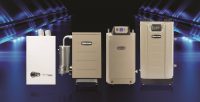
Offers Help Homeowners, Commercial Businesses Save Money on High-Efficiency Boiler Purchases
Growing awareness of the benefits of energy efficiency and increasing performance standards for heating systems are important drivers in the boiler market. Focused on these trends, Weil-McLain, a leader in hydronic heating systems, recently launched EcoRebates industry-leading rebate tools on its website. The tools automatically highlight rebate and incentive savings available to homeowners and commercial entities based on their location when they research and view qualified energy-efficient boiler equipment.
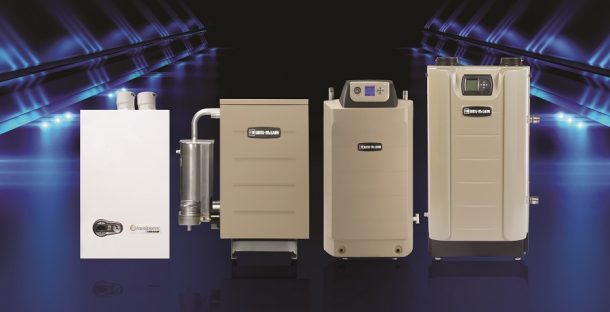
EcoRebates tracks thousands of rebate programs offered by utilities and energy service providers that offer cash-back to homeowners and commercial entities that purchase energy efficient hydronic heating equipment. Using the rebate tools on the Weil-McLain site, homeowners can easily find rebate savings, up to $2,500 in some areas, with higher savings available to commercial entities purchasing larger equipment.
“The rebate center is a powerful tool that is simple for homeowners and business owners to use and automatically displays location-based rebates and savings on energy efficient products in real-time,” said Scott Butterfield, VP of Marketing and Business Development at Weil-McLain. “We are excited to offer this solution to our sales team and dealers to provide a valuable way to present savings to customers throughout their high efficiency boiler purchase journey.
“Weil-McLain is the North American leading boiler manufacturer who remains strong in the high-efficiency boiler market,” added Brett Battles, Co-Founder and CEO at EcoRebates. “We’re pleased to work with them to deliver these valuable savings opportunities into the hands of their customers.”
More information on rebates for Weil-McLain residential and commercial boiler systems is available at www.weil-mclain.com/rebate-center.
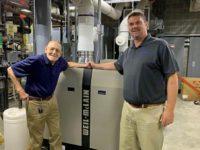
“Boilers are in my blood,” explained 44-year-old Shane Hall, a third-generation Weil-McLain representative. Hall, of Huntington, W.V., has been a Weil-McLain manufacturer’s rep for more than 25 years, but his involvement in heating and boilers stretches back much further. “My father and grandfather were both in the business, so I grew up in the industry,” Read more
“Boilers are in my blood,” explained 44-year-old Shane Hall, a third-generation Weil-McLain representative.
Hall, of Huntington, W.V., has been a Weil-McLain manufacturer’s rep for more than 25 years, but his involvement in heating and boilers stretches back much further.
“My father and grandfather were both in the business, so I grew up in the industry,” said Hall. “I like to say that I learned from the best.”

Weil-McLain Rep Shane Hall and his grandfather, Herb Godschalk.
Hall’s grandfather, Herb Godschalk, opened his heating company HL Godschalk & Associates in 1968 in Huntington and immediately began selling Weil-McLain boilers. The company handled both commercial and residential projects and installed numerous cast iron boilers and other heating and plumbing equipment across West Virginia.
“We’ve been selling boilers since way before I was even born,” said Hall. “Weil-McLain has a tradition of giving out die cast toy cars, and I remember receiving them as a child as gifts from my grandpa. Ever since I can remember, Weil-McClain has been a part of my life.”
Hall’s father, James Hall, began working with Shane’s grandfather in 1975. A young Shane Hall would help out with the family business as needed.
“My grandfather would pay me to assemble product catalogs, sweep the floor – whatever had to be done,” said Hall. “I believe he paid me a quarter an hour back then. I guess you could say I learned the business from the ground up!”
When Hall’s grandfather passed away in 1993, his father took over the company. Soon after, at the age of 19, Hall began working full-time with his dad.
“I started in the warehouse and worked my way up to inside sales and then outside sales and eventually took over the company,” said Hall.
Both Hall and his father witnessed many boiler product innovations, including the development of high efficiency condensing boilers such as Weil-McLain’s Ultra, and later, Evergreen units.
“They were really innovative products and helped move the entire industry forward,” he said.
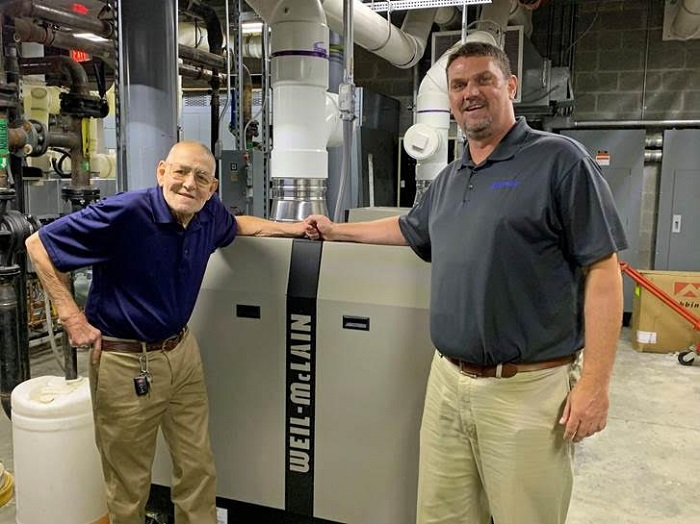
Shane Hall and his father, James Hall.
Hall’s father ran the company until retiring in April 2007. Hall then took over and re-named it Hall Sales Agency. After overseeing its growth for several years, he eventually merged it with Midwest Spec, a conglomerate of three other family-owned HVAC companies.
Today, Hall is a junior partner with Wickliffe, Ohio-based Midwest Spec and still manages the boiler business for the West Virginia territory. In 2015, Weil-McLain asked Midwest Spec to also represent them commercially in the expanded territories of Ohio, Kentucky and Western Pennsylvania, and Hall oversees that business as well.
“Weil-McLain is the only line my grandfather offered that I still sell,” said Hall. “We’ve had a lot of heating and plumbing lines and brands come and go over the years, but that’s the only that has been continuous for us since 1968.
“The only boiler line we sell today is Weil-McLain because the company has such a broad product portfolio ranging from small residential 70,000 BTU units up to large 8 ½ million BTUs on the cast iron side and for high efficiency from 70,000 BTU’s up to 3 million BTUs.”
Hall has overseen numerous residential and commercial installations including at the Rock & Roll Hall of Fame, West Virginia capitol complex, West Virginia University and countless other schools and colleges, churches and homes.
“We had a Weil-McLain boiler at a university that we inspected that at the time was 55-years-old and still functional,” said Hall. “The school had money in the budget to spend and thought it was a good time to upgrade the boiler. It was hard for me to see them pull it out after all of those years because it still worked like a champ!
“Weil-McLain produces high-quality, American-made products, and has always stood behind their line,” said Hall. “You can walk through the foundry and shake hands with the guys that are pouring the iron, and those guys will thank you for selling their product. Weil-McLain has touched so many lives over the years, including mine. It’s really special.”

We are approaching the end of the 2018-2019 heating season in North America, although homeowners in the colder northern sections of the United States and throughout Canada will likely need their heating systems for another two, maybe even three months. As you know, our long cold seasons can take a heavy toll on hydronic heating Read more
We are approaching the end of the 2018-2019 heating season in North America, although homeowners in the colder northern sections of the United States and throughout Canada will likely need their heating systems for another two, maybe even three months. As you know, our long cold seasons can take a heavy toll on hydronic heating systems. Here’s a rundown on some of the more common boiler and component problems facing home and business owners and what can be done to remedy them.
 Radiator cold spots
Radiator cold spots
If your home’s or business’s radiators are not uniformly hot throughout, the following could be the culprit:
- air in the piping and components;
- a malfunctioning component or part, such as a circulator or a valve; and, finally, our “favorite” villain —
- rusty or corroding system pipes that ultimately fill the radiators with magnetite.
What is magnetite? As air and water mix inside the pipes of an untreated hydronic heating system, an iron oxide sludge, called magnetite, forms. As these small (.0003-micron) particles circulate and accumulate inside the system, they begin to adversely affect heat-transfer rates and boiler efficiency. Eventually, iron oxide buildup can lead to equipment damage and/or failure, resulting in costly repairs. Just how extensive is this problem? A recent study analyzing returns to European pump manufacturers found that nearly 70 percent of circulator returns consisted of failures triggered by iron-oxide buildup. The study also showed that more than 95 percent of the debris in hydronic heating systems consists of iron oxide*.
The fix? To eliminate air in the system, first try bleeding your radiators. But if the cold-spot problems persist, bring in a professional plumbing and heating contractor to:
- conduct a full system inspection;
- upgrade failing parts;
- fully cleanse the system with a magnetic dirt filter, as well as a chemical cleaner, such. This maintenance should remove not only the rust, but also all the other debris.
Noisy system
Maybe your boiler rattles every time it rolls into action. Maybe you are routinely treated to a chorus of bangs, gurgles, whistles and rumbles from elsewhere in the system. Regardless, such noise goes beyond mere annoyance; it might indicate more serious problems. Once again, air as well as a buildup of limescale are the most common culprits.
The fix? To eliminate the pipe noise, get rid of any trapped air by bleeding your radiators. If that doesn’t work, call a professional to flush the entire system of limescale and air. If the noise originates in your boiler, your service technician will work to remove limescale in the heat exchanger.
Leaks and drips
Water leakage from your boiler is never a good sign. Leakage usually means a breakdown is imminent. It’s a simple problem to spot. Is there any water beneath the boiler or around its pipes and tank? Causes can range from broken parts to corroded pipes.
The fix? Whether the problem stems from a damaged component or simple wear and tear, there’s only one answer for leaks and drips: Call a professional to check your boiler.
On the subject of leaks, it is often questioned whether cleaning chemicals cause leaks within hydronic systems. The answer to this is — no, if, of course, you are using correctly formulated chemicals, which includes surfactants, dispersants, and inhibitors that make it pH neutral. The surfactants and dispersants help dislodge, lift and move the corrosion, while the inhibitors protect the vulnerable metals during cleaning.
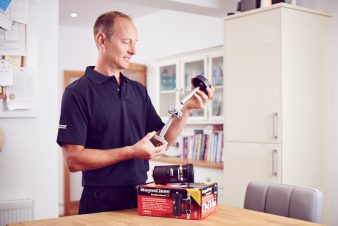 Complete protection
Complete protection
The rising popularity of high-efficiency boilers and the increased use of high-efficiency ECN (electronically commutated motors) pumps with these boilers, have helped lower fuel bills. That’s the good news. The downside: both of these positive trends can also create system-performance headaches for home and business owners. We will explore the why behind these problems in a future blog. For now, understand that both trends can lead to premature system and component failure because of the buildup of iron oxide sludge (magnetite) and other nonmagnetic debris. Both can rob hydronic heating systems of their high efficiency and superior performance.
The solution is magnetic dirt filtration, along with regular and proper system cleansing and protection. This is the only way to prevent the buildup of magnetite and the costly problems it can cause.
GUEST BLOGGER: Brian Salem, ADEY Western/Central North America area sales manager.
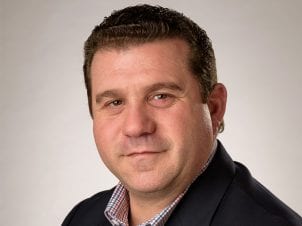 Growing up in his Dad’s plumbing company, Brian has a wealth of experience within the HVAC/P industry. Professionally, Brian has been in the industry since 2004 and joined ADEY in 2017 – his role began as OEM Manager for North America but due to ADEY’s growing network of North American Reps, Brian has now taken the reigns as ADEY’s Western/Central North America Area Sales Manager. Brian Salem: brian.salem@adey.com, (847) 440-6665
Growing up in his Dad’s plumbing company, Brian has a wealth of experience within the HVAC/P industry. Professionally, Brian has been in the industry since 2004 and joined ADEY in 2017 – his role began as OEM Manager for North America but due to ADEY’s growing network of North American Reps, Brian has now taken the reigns as ADEY’s Western/Central North America Area Sales Manager. Brian Salem: brian.salem@adey.com, (847) 440-6665
